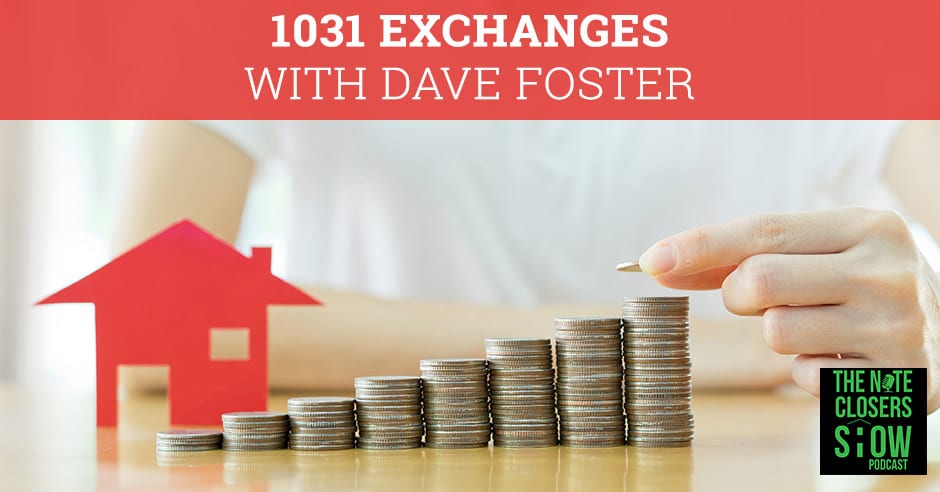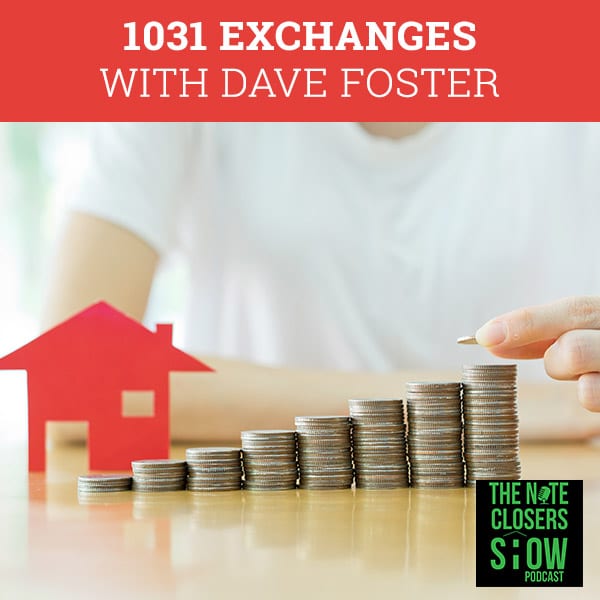
—
Listen to the podcast here
1031 Exchanges with Dave Foster
I am jacked up to have the man in his field and the guy that just rocked out his specific niche of real estate investing. We get a lot of questions about this niche from different investors out there looking in to dive in a note or wanting to see if notes can work for them. I am talking about Dave Foster, The 1031 Investor. Dave, how’s it going?
We’re doing awesome.
Dave, share who you are and why they should be reading this.
What I do for many years now, I have lived within a niche of real estate tax law that few people know of but is so powerful to build in an investor’s portfolio as they go through their investing career. It’s called the 1031 tax-deferred exchange. What it is, in a nutshell, is the opportunity that the IRS gives us to sell investment real estate. By using a certain process, purchasing a new investment in real estate, you get to defer indefinitely paying the tax on the gain and all depreciation recapture. When you stop and think that by the time you include federal and state capital gains tax in most states, you’re going to spend 20% of your profit just paying your silent partner, Uncle Sam. By using the 1031 exchange, you’re able to take that 20% and buy more real estate for yourself. You can imagine how that leverages itself throughout the years of an investing career and that’s what I do.
Anytime you can add another 25% of your bottom line without even paying Uncle Sam or defer that, it’s a very powerful tool to do that. I always like to do a little research on different topics before going on. 1031 is the IRS Tax Code number that’s why it’s known so well. The deferred exchange is the legal terms of what we’re talking about. Is that correct?
That is correct. 1031 is the section of the Tax Code. A lot of people think of it as this new thing and I hear it called a loophole. It’s been around since 1922. Originally, it started out as a way to let landowners who were land rich in cashflow. As a matter of fact, in your neck of the woods, they have traded properties so that they get personally put together their farms there without having to invest cash or pay tax as a way of stimulating the agrarian economy. Someone went out over the course of two years and bought a truckload of other properties. His name was Starker. A lot of people reading this might recognize that as another euphemism for the process, a Starker Exchange. The long and short of it is the IRS disagreed and he was lawyered up. For twenty years, they duked it out and ultimately as never happens in real life, he won. Now, what we have is a process where you don’t have to swap properties. You can simply sell a property and then go and purchase your replacement using a very special process because as you can imagine, the IRS has to let us do it, but they don’t have to make us like it. There’s still a little passive-aggressiveness and this statute, but that is what it is. It’s that easy now and that’s what people don’t understand.
Before we dive in asset classes on different things, let’s talk about some of the timeframes. You’re selling an asset. How long do you have to identify the new property and how long do you have to close on it? Those are two of the biggest things as timing goes.
Those are the two that can trick you. As a matter of fact, I have more exchanges failed because of those timeframes than anything else. The first and foremost thing that people have to understand is you have to use a third party who’s going to document the exchange and who’s going to hold your proceeds. If you have constructive or actual receipt of the proceeds, the IRS will let you do it. There’s too much opportunity for you to move the money in ways you should. There’s this whole class of people called qualified intermediaries and that’s what we do. We document and process. That QI has to be in place prior to the closing of your sale and you want to think about your 1031 exchange as starting with that sale. For you and I, it’s backward. As a real estate investor, you make all your money when you buy it. When you’re doing 1031 exchanges, you’re saving all your taxes when you sell so that starts your 1031. From that date of the closing of your sale, you’ve only got 45 more days to identify your potential replacements. After day 45, that has become so hard and those are the only properties you can choose from.
You have a total of 180 days to complete that purchase. As you can imagine, that 45 days is a time crunch. There are a few things that we will talk to people about early on that can help to mitigate that. Number one, you can always go into contract for your new property whenever you want. You just can’t take title until after you close your sale. While thinking it’s hot as a seller’s market, it was tough to get contingency contracts but now it’s a little bit easier. Get a seller to give you a contract contingent on when you sell your own property to start at 1031 and that can work very well. Of course, to mitigate as much risk and give you as much sleep at night as you’d lie down, try to give not only under contract but even close during that 45 day period. There are a couple of things. First of all, it eliminates the risk of going past day 45 not having something, but also the quicker you can get that money put back to work, the quicker it’s performing.
It almost doubles your return in the first year because you’re not waiting for that 180 days to close on it. That’s the numbers that popped in my head.
Those are a few of the things that people will use. When you stop and think about it, if you read the calendar backward, the normal investor is going to do it 30 days except then they’re going to put it on the market and it’s going to be 60 days to close. If you had 45 more days on top of that, you’re looking at four or five months to locate your new property. Although it feels very tight, it’s not quite as tight as much as you would think.
That’s true with a lot of different things that go on with that. A traditional first lien because we talked about note investing. Let’s talk about the type of properties people can use or the type of investments people can or cannot use to qualify for a deferred exchange.

1031 Exchange: You can always go into contract for your new property whenever you want.
There is a gap. There’s still a lot of confusion out there. Prior to 2018, it was any kind of real estate for any other kinds of real estate and any kind of personal property for any other kind of personal property. You could sell a general item and purchase about any general item or heavy equipment to heavy equipment. Where it interfaces with us are things like assets of restaurants and hotels. You can exchange the real estate portion of a restaurant for other investment real estate and then you could also tack on another exchange of the equipment for the restaurant for more restaurant equipment. It was an awesome way to defer all kinds of tax. Because they’re the government and they’re here to help, they eliminated that part of the statute. Now it is solely for investment real estate, but any kind of investment real estate will qualify as what we call like-kind for any other kind. You can sell a single-family home that’s been held for investment and purchase a duplex. Sell a duplex and purchase an industrial warehouse. Sell an industrial warehouse and purchase farmland. Sell the farmland and purchase a condo complex.
It’s an amazing variety that’s out there. You’ll appreciate this because all states define it this way. Oil interests, natural gas interests and mineral rights interests, whether they are working interests or royalty interests in existing wells qualify as real estate. You could sell a duplex and go buy a royalty interest in some working wells. What’s cool about that is that real estate and oil go side by side. If the oil is down, real estate is down. This lovely cycle now will react to what we think is close to the top of a real estate cycle. What is oil starting to do? It’s now surging because of the things that have to do with what the administration has done with OPEC. We’re in this contracycle where now I’ve got some administrators that are starting to jump off the real estate wagon and jump onto the oil and they’re doing it without paying tax because of the 1031 exchange.
Here in Florida, we’ve got some fun things that are called real estate. One of them has a hole in the water where you park a boat. We call it a dockominium. It literally all it is. It’s a place in a marina. If you have a deeded tenant share in that real estate, it is realistic. You could sell other than an investment condo and purchase a slip to rent out for investment and turn that into a home for your next vacation. The key is it has got to be real estate. The state has to consider it as real estate and the best way to know is, do you have a deed and do you get a tax with every year from the property appraiser?
That would justify us in buying a contract for deeds or getting the deed on the property and we’re getting the tax bill sent to us on the county appraisal district then. Is that correct?
If you’re getting the bill sent to you in your name so that you are the deeded owner, then yes. That would qualify. Typically, in land contract sales, the sale is deemed to happen the moment the contract signed and not when the deed transfers. When that deed transfers, if that’s been an option or if you’re buying subject to a loan but the deed still transfers, then that will qualify for 1031.
How difficult is it to identify this stuff working with a third party like yourself to do this? What kind of simple documentation? Is there some paperwork?
1031 is an added process to your normal operating. You do everything you normally would but there are additional documents that are part of the closing package. You sign a few extra papers and that’s it. It’s crazy. Where you would normally prepare your property for the market, sell it, go and buy a new property, contract it and purchase it. That’s exactly what you do using all of your normal professionals. The difference is the QI is providing additional documentation and your funds are going into escrow and being held for you until you complete your purchases.
Can they take their money and the profits that they’re getting from that property sale at 1031 sales? Can they use that as down payments or do they have to use cash to buy the new asset full cash or can it be partially financed?
The rule for reinvestment is that if you want to defer all tax, you need to purchase at least as much real estate as you sell and you need to use all of the proceeds in that purchase or purchases. What you’re getting at, it doesn’t have to be one for one. As a matter of fact, very few real estate investors do that. Most of my people will take an appreciated asset. They will sell it then we use the proceeds as down payments to purchase two or more and there’s a whole lot of wisdom behind that. First of all, when you’re buying less expensive assets, usually your return on purchase is higher. You get more rent per dollar for $100,000 property than you do for a $200,000 property. If it’s appreciated to $200,000, sell it and go back and buy two $100,000 pieces of property. The other thing is that that’s going to be a market niche that you’re no better. Rather than starting to price yourself out where you’re ending up someplace where you’re not familiar, you keep selling and going right back into your sweet spot. You know what kind of floors to put in and what kind of finishing to put it on that property.
They appreciate, and you sell those and you buy two more. A strange thing happened, Scott. You wake up one day, and you’re tired and can’t figure it out, “Why am I so tired?” All of a sudden, you realize it’s because you’ve got this whole garden of small properties that are killing you. What you start to do is sell three or four of those and purchase one larger asset like multifamily. That’s what’s called consolidation. 1031 can let you diversify into different classes or different numbers of properties and it can let you consolidate to wherever the market is wanting to lead you.
It’s a great thing out there because a lot of people love building and buying more assets, but at some point, you don’t want to work that hard. That’s why I like the note business.
That dovetails nicely into the second half of that which was, “How can you use your money?” Remember that 1031 has to be real estate for real estate. You use your proceeds to purchase another piece of real estate or a couple that is going to provide a better return for you. One thing you may do is allocate those proceeds however you want. Purchase one property for all cash. Use the remaining as a down payment to highly leverage the second piece of property. You’ve got a 1031 exchange, sold your old property, you just bought better tax return, you started to consolidate your cash again, but you’re aggressive and you’re like Scott. What are you going to do? Do a refinance on that new property. Take the cash from that and go find a place to put it where you’re going to generate a return. Are you at 5% or 6% may be on an investment credit loan? What can they make with you investing with notes?

1031 Exchange: Use your proceeds to purchase another piece of real estate or a couple that is going to provide a better return for you.
Let’s recap it. You’ve got money rolling out from 1031 exchange, you’d go pay cash for an asset, qualify that and then you get a line of credit or get a refinance, pull your own capital with refunds. Use that money from the bank or whoever you borrowed to use that to purchase your loan.
I love that strategy because it does a couple of different things. First of all, it arbitrage as your bank financing. I have no clue what the real numbers would be, but you’re able to borrow at 5% and invest at 10% so you’re making a nice return of that. Secondly though and maybe more importantly, you’re starting to move your active portfolio into a passive position, but you’re doing it without having to pay tax. If you’ve got $100,000 in built up capital gain, which isn’t that much, that represents a $20,000 or $25,000 tax bill. $25,000 is invested at 10% is $2,500 a year. For every $100,000 in profit that you defer the tax on, you’re adding $2,500 a year to your pocket to spend as you want. That’s how retirements are built.
How does the asset have to be titled as far as the deed of trust? Is it in the person’s bank? Can it be in an entity, an LLC or a trust? I guess you wouldn’t necessarily use somebody’s self-directed IRA to fund this because that’s tax differed depending on how it’s structured.
Any kind of tax-deferred IRA or 401(k), those are already tax-deferred. The 1031 amount is the exact same product, what is used inside your retirement account and what does not use outside your retirement account. The difference is that when you’re doing it with 1031 outside your retirement, you’re not only getting tax-deferred, but you’re getting the other benefits of real estate ownership expense right off depreciation against the asset value. All those things reduce your personal taxable income. If you’re doing it within your IRA, you get the tax-deferred, but you don’t get it out of their stuff because there’s no tax. That could be that, but the key is that any taxpaying entity can do 1031s. All of those vehicles you mentioned like escrows, LLC, C corps, trust and individual ownership, anybody could do a 1031 exchange, but the taxpayer for the old property has to remain the taxpayer for the new property. If you have an escrow that wants to assemble a piece of real estate, that escrow has to take title to the new piece of real estate.
Do they have to take it to 100% or solely to them or if they’re bringing somebody a partner splitting the payment?
Whatever those investment requirements, as long as you are purchasing at least as much as you sell. If you sold the property for $200,000 and you want to buy a $400,000 quad with a friend, to complete your 1031, you would need to take title to 50% of it. If you take that 50%, they could take title to the other 50%.
That’s good to know because somebody has asked that question out there if I wanted to partner with somebody out there, which is good. What are the biggest mistakes that you see investors making that are trying to do 1031 exchange? They’re not identifying, but they get squeezed with that 45-day without taking it seriously.
It goes back to what I teed off with at the very beginning. Once a week I start sobbing because somebody calls me and says, “I sold a piece of property and I want to do 1031.” I have to break the news to them that because we were not in place prior to the closing of the sale, you can no longer do the 1031. That’s number one. The number two example would be the titles of those 45 days. People that don’t take it seriously don’t prepare ahead of time. Even if you’re not going to contract before you close your sale and for a bit of research and due diligence that you can do prior to the sale, it just speeds up what you’ve got to do after. You’ll know if you have spent two months looking at a market, you’re going to know a good deal the instant you see it and you’re going to be able to jump on it. I would say the third thing is that people will panic and will do one of two things. They will either not do 1031 because they’re scared they won’t find a property or they’ll do a 1031 and then they’ll buy a property because they have to. In fact, a 1031 exchange is not a very expensive proposition.
Nationwide, if it’s a garden variety property, you’ve got to pay $750. To spend $750 to kick the can down the road for 45 days to try and find a property that you’re going to save $25,000 on, that seems to make a bit of sense, especially when that $750 is going to be tax deductible as well. It’s going to be spending $400,000 to $500,000. That part makes sense. The other half of that though is if you can’t find the property, don’t finish the 1031. There’s no penalty for starting and not completing a 1031 exchange. As a matter of fact, the very way that they are in restructures is that your exchange will always be complete before you have to file your next tax return. If you can’t find a property, let it die. When you file your next return, you pay the taxes. What did you lose at the end of the day? Not much.
How does seller financing affect a 1031 exchange?
Let’s go back to the reinvestment requirements. Buy as much for yourself and use all the proceeds of the sale. In an order chairing, one of the things you have to realize is that the note is a proceed. The note is going to go into your exchange account along with the cash. Let’s say that you sold a piece of property for $100,000 and they give $50,000 down and a note for $50,000. You started 1031 exchange and in your exchange account, you have $50,000 cash and a $50,000 note. You have to use those things to purchase your new property. Can you do that? You could go to the seller of the new property and tell them, “I’ve got cash and I’ve got this note. Will you accept it?” They’re probably going to say no because it’s a note that they don’t have a clue about. It’s unseasoned, but I know a guy named Scott that deals with notes all the time. What if I were to take that note and offer it to Scott to purchase? Is there anybody you know that buys notes?
A few people.

1031 Exchange: If you’re charitably minded, the charitable remainder trust is a nice alternative to a 1031 exchange.
Let’s assume that you’re in a generous mood and you buy that note for $50,000. In my exchange account, I have $50,000 in cash and I have $50,000 in cash from the sale of the note. Can I go and finish my 1031? Absolutely, there are no problems at all, but it can’t get even better for someone if they don’t want to sell the note on the open market but they have cash themselves. They can also swap out $50,000 in their own cash for the $50,000 note. Inside their 1031, they’ve got $100,000 in cash. They could go buy a new piece of property if there’s 1031. Meanwhile, outside the 1031 exchange, they own a note for $50,000. What did they pay for it? They paid $50,000. How much of that note is taxable? Zero. The only thing they will pay tax on for the remainder of that note is going to be the interest that comes in every month. They did a 1031 exchange, completely deferred all tax, they pumped themselves tax-free income and they made that deal happen and all they’re going to pay is a little bit of interest coming in every month.
Is there any difference if somebody is using a charitable trust or anything like that as an alternative for things? We have a question here, “How can a charitable remainder trust be used as an alternative?”
The charitable remainder trust is a peculiar animal that is going to take the tax and give it to the charity of your choice. That’s the net and back of the entire thing. You’re going to donate the asset at a certain value. You’re going to receive payments and at the end of the time, the remainder of whatever is left goes to the charitable entity of your choice. If you’re charitably-minded, it’s a nice alternative to a 1031 exchange. The only beef I have with charitable remainder trust is that they don’t save you any more money. That money goes to a charity you like. It’s not as good as giving the money to yourself, but at least you’re giving it to friends.
If somebody is selling off a piece of property like a duplex, triplex or an apartment complex, is it half the money I had to go into an already built property or can I buy the land in a project that’s being built or anything like that?
We can do some fun things with that. You’re taking title to add about a real estate. Let’s say that you are selling a property for $100,000 and you wanted to buy a lot for $100,000 that you were to build a quad on. Simply selling the house and buying the lot covers your 1031 exchange. Let’s say that the lot was only $50,000. You’re going to have a problem because you’re buying less than what you sold. You can either pay tax on the difference or you could wait to take title to the lot that has a builder who owns the lot to start construction. Whenever that lot is worth at least as much as you sold, then you could execute the purchase of it because you’re taking title to at least as much as you sell. We will see that a lot of times in certain markets. I used to do it at a time down in Fort Myers, Florida where we had some builders that got it.
The builders would say, “You tell me what lot you want. I’ll take title to it and I’ll build it taking periodic draws from you.” Our client did not own the lot. They did not own the house, but they were using draws as earnest money deposits so that at the end of the time the house was complete, we’d have a closing, and they would take title to the house. That’s a very elegant solution to it. This is on the deep end of things so get ready to dive. The 1031 exchange requires that you do not take title to your new property until your old property closes, but we could make it look like the opposite by doing what is called a reverse exchange, a construction exchange or an improvement exchange. They’re all variations of the same theme. The theme is an IRS approved process where your QI takes title to the lot. You have absolute control over that lot. You have the use of it and the ability to develop it. You carry the insurance, pay the maintenance and the taxes. You get the income off of it, but you don’t own it. Nothing is more different than a Walgreens that has land to lease for their building.
The QI owns a lot, but you decide if you’re going to build a property or a house on it. You said about building that outside on or it’s a small apartment building that needs a lot of value there. You sold an asset for $500,000 and there’s a small apartment building you could buy for $300,000, but it needs $200,000 more of fix up. The QI takes title to it and we hold it while you put $200,000 into it. Once you have put $200,000 in it, what it’s worth? The price of the acquisition, $300,000 plus the improvements you put into $200,000. Can you take your $500,000 sale and go buy that property from the QI? Yes.
You withhold, in that situation, $300,000 to purchase the new one and then $200,000 which is being held back and getting the improvements done over the next 180 days before the title changes.
It could all come from your exchange account if you’ve got the money in there. That’s obviously the cheapest and that works when you go get it, but you can also borrow the money. If you’ve got the cash proceeds, you could use your own money. When we complete that 1031, it’s as if you were a lender to the QI so the QI pays you back the $200,000 and only the $500,000 from your 1031 goes into that. Reverse exchanges can be awesome for value add properties.
My buddy Aaron Young from Laughlin said, “Prepare with the end in mind.” It’s not difficult to pick up the phone and give you a phone call and walk through what they’re trying to do to get a better picture if they’re looking at a property for six months or three months or a year from now.
Preparation is key. You’re never going to cause angst by answering questions because knowledge is important and you may have to bring a realtor up to speed. Sad to say, you may have to bring your accountant up to speed. You may have to negotiate with an ignorant seller or buyer. I get a lot of scenarios all the time or someone will say, “I’d negotiate with this old guy.” That’s the keyword. We all wanted the old guys’ near us when it’s time to buy. He owns the property for 30 years. He won’t sell it to me because he’s going to pay a ton of taxes, but he wants to start to become more passive. What if they’ve got enough runway? We can start to educate them about the 1031 process. We can start to educate the old guy on his options so that he can all of a sudden realize that he could get out of this building and not have to pay tax. Take his money and put it into something that’s going to be a more appropriate retirement type vehicle. It’s definitely more rather than at the last minute.
Here’s the other extreme to that. I’m not even sure I should share this. The only requirement is that the QI must be in place at or prior to the close. My record was twenty minutes. We were at closing and we went to the buyer’s side. They were finishing up the 1031. I went to it just for fun and you can imagine I walked into the room and they thought it was an enforcer. The seller was going, “Who are you?” I was like, “I’m the QI. We’re doing a 1031 exchange. These people don’t have to pay any tax.” They looked at the realtor and said, “Can you do that?” That realtor said, “Yeah.” He said, “You’re fired.” They were joking. We took a coffee break and twenty minutes later, the sellers were doing 1031. The idea is plan as far ahead as you can, but even if it’s the last minute, you woke up on Monday and said, “I’ve got a closing on Tuesday. I’ve got a 1031.” It can’t be done.

1031 Exchange: When you die, your heirs get your assets. It’s what is called a step up in basis. It means they get your property as if they paid market value for it of the day you die.
There’s a whole another element to this planning with the end in mind thing. For some strange reason, there’s a quote of mine that’s making the rounds and I take it as a backhanded compliment. My quote was, “Because of where I live at 1031, you can live tax-deferred your entire life,” which means as long as you owe their replacement property, you’re never going to pay the tax. As long as anytime you sell that property, you are never going to pay the tax. You can live your life tax-deferred and you can die and you’ll be tax-free. The only problem is you have to die to get it, which I don’t recommend. There are some benefits to you because as long as you live, you get the use of that tax. That’s compound interest. That’s the tick of the clock on income for you as long as you live. Here’s the kicker, when you die, your heirs get your assets is what is called a step up in basis. It means they get your property as if they paid market value for it on the day you died.
In other words, the tax disappears for your heirs. You’ve got to die, you don’t directly benefit, but you’ve got some happy kids. That’s a neat legacy to leave. I have one set of clients from the Northeast that are on their third generation of doing this. Their grandfather left who did 1031s with us. He left a substantial portfolio to his children and his children started at zero tax and continued their own investing. One of their parents died, his children are now taking his portion and it’s tax-free and they’re starting to build their own. The zeroes behind this number are pretty astounding.
If they end up $400,000 property, they 1031 exchange that into eight $50,000 properties for eight of their kids. Their kids could start off doing that aspect as well. It’s what you’re saying.
That’s exactly right. The idea of 1031 is ebb and flow. You diversify and increase your holdings. Towards the end of your career, you start to consolidate your properties, less management and more cash so you can do things like invest in other classes like notes. Finally, in the end, you go into things that are passive like triple net properties, tenants and common properties, Delaware statutory trust, oil leases because those all require no effort. You’ve got to take your Alaska cruise and enjoy the retirement. Your money is safe. Finally, when you pass away, those properties go to your heirs and the tax disappears. At that right there in about 30 seconds is a lifetime of 1031 investors.
Have you ever seen people taking on and putting options on a lot of properties prior to them closing on their properties as a way to start that ball rolling or at least get a price negotiated on the front end before they sell their existing property?
Absolutely and that’s a great way to do it because the seller obviously is always going to be concerned. Will this person follow through? They’ve got to sell another property. Will they do it? Will they come through? An option to purchase where you put some consideration in the game is a great way to convince that seller that you mean business. Another way to do it is a contract that may have an extended or floating closing date that has releasable earnest money. All those kinds of things can be used.
Where do you see the mass majority of the properties these days that you’re working on? Is it geographically-centric or is it asset class-centric that you see a lot of the day? I’m sure it’s all across the board.
It’s both. My friends in the multifamily business will shoot me, but multifamily is what everybody is talking about, but it’s like reaching pretty frothy peaks. Turnkey properties are the same sort of thing. I wouldn’t say that it’s so much asset class-centric, it’s where the deals are from but there is definitely a demographic component to this. Our friends on the West Coast are struggling to make cashflow. It’s more of a shift of priority that I’ve seen from properties that you hold because of the appreciation potential. Moving those into places where they can get a better return. I’ve seen my California and New York friends selling properties. They’re operating income and they don’t mind that it represents about a 2% capital rate. That’s not sustainable. If that $500,000 property is appreciated at 10% year, it’s worth holding on to. They’re starting to feel like that may have peaked so now they are looking at what we call the flyover states.
There’s also a strong move into the sub-belt states because people love to position their assets where they want to retire. You see that and we see that in Florida. That’s a big one as well. They position it because of their tax-free status. Remember, you’re going to defer except in Pennsylvania right now which does not recognize 1031 on the state level. If you’re going to California, which besides being the second highest taxed entity in the world, it also has what they call the clawback where no matter where you sell your 1031 if you ever sell that, you’re going to have to pay California back the tax. No place else has that yet, but it’s coming. If you sold a property in Colorado where there is a state tax, purchase something in Texas where there is none. When you sell that ultimately, even if you don’t do 1031, you’re going to pay the fed tax maybe but you’ve eliminated the state tax. Places like Nevada, Tennessee, Texas, Wyoming, Florida and Washington, all those places without state income taxes, people are starting to see the dollar figures.
We’re getting a lot of California people move in here. We joke around California with all the droughts and the fires, there are no more fruits. It’s full of dried nuts.
You could say that and then I’ll take their side on things because I was in Denver for twenty years. Anybody coming down a ski slope and a cowboy hat, we stripped with our ski things.
Are you seeing a lot of this take place down in God’s waiting room there in Florida as well?

1031 Exchange: People love to position their assets where they live.
That’s exactly what they used to call St. Petersburg, God’s waiting room. The demographics still is and as a matter fact, I read an article and it was talking about migration patterns. Florida hated in particular the Northern and England portions. For the middle North are really seeing incredible amounts. The places in between Orlando and the Gold Coast, Orlando, St. Augustine and the North up towards Jacksonville, there’s a huge growth and it’s for a couple of reasons. Number one, we’re still a little bit behind the curve appreciation-wise because we got hammered so bad in 2008. We were ground zero. The other thing is people love to position their assets where they live. Here’s another tip or trick to 1031 that they’re taking advantage of. Remember that 1031 is a sale of investment real estate followed by a purchase of investment real estate. What that means is real estate that you intend to hold for productive use in business, trade or for investment. The key phrase being that you intend to hold.
There is no statutory requirement that it must remain your holding as investment real estate. As a matter of fact, there is a safe harbor that the IRS has given us for this and the process is this. If you live in Brooklyn, New York and you sell a rental property that you have there a couple of years ahead of retirement. You use the proceeds to purchase a dope kicking waterfront short-term vacation rental in St. Petersburg. The purpose is for a couple of years. First of all, you’re going to generate some revenue. Secondly, you can use that some for yourself for personal use. At least when you get down here, you’ve got a place to vacation, you’ve got income coming in and you deferred all your tax when you’re ready to retire.
Two things happen. First, you sell the property you lived in. There are still a lot of people that don’t know this portion of the code. When you sell a property that you own and live in and you’ve lived in it for two out of the five years prior to sale, as a married couple, you could take the first $500,000 in profit tax-free and you can do that once every two years. You’re going to sell your property up North and you’re going to take that money tax-free. Where are they going to move? You’re going to change the use of your vacation rental down here at St. Petersburg and do that by simply moving into it. By moving into it, you are changing the use. You do not create a taxable event. As long as you continue to own that unlimited, you pay no tax on it.
That’s one big thing about using a self-directed IRA. You can be living in it and you can take personal use.
That’s a huge difference. You could have no personal use of it.
Dave, what’s the best way for people to get ahold of you or the best way to reach out to you in case they’ve got questions or want to use you as a QI?
The best way to catch me is on our education website, which is The1031Investor.com and Dave@The1031Investor.com. We’ve got a whole series of training videos, calculators and all sorts of things that we talked about. That can also hopefully be a benefit to you and your audience.
We are honored to have you on. I know I learned a lot of stuff so I know the Note Nation definitely learned some of the great keys to be able to use 1031 to help you go out and identify some notes that you can invest by structuring the deal properly. Dave, thank you so much. I’m looking forward to seeing you on a Note CAMP Commercial that we’re talking about as well too. Check out The1031Investor.com or Dave@The1031Investor.com as well to reach out to him for any questions or to help you start planning with the end in mind in case you’re looking to sell some of your real estate off and want to avoid on the taxes and use a 1031 exchange. Thank you so much for reading this. Thank you so much for sharing. If you enjoy this, make sure you go onto YouTube, Vimeo and leave the comments there. Make sure you go on to iTunes as well and leave us a review and a five star. I would appreciate it. Otherwise, go out and make something happen and we’ll see you all at the top.
Important Links:
- The1031Investor.com
- Laughlin Associates
- Dave@The1031Investor.com
- Note CAMP Commercial
- YouTube – We Close Notes
- Vimeo – We Close Notes
- iTunes – The Note Closers Show
About Dave Foster
 Dave understands that real estate is really an investment in the future. As a multi-industry visionary, he has 20 years of experience working in all phases of real estate investing.
Dave understands that real estate is really an investment in the future. As a multi-industry visionary, he has 20 years of experience working in all phases of real estate investing.
As an investor himself, he views each investment as a unique opportunity to maximize returns. A degreed accountant with a Masters in Management, Dave built his reputation on being a driven, results-oriented QI who works relentlessly to optimize value for real estate investors.
He is inspired by a genuine desire to help investors excel, and he continuously strives to create win-win situations. Dave recently launched The1031Investor.com to give investors instant access to the information they need to succeed with 1031 exchanges.

